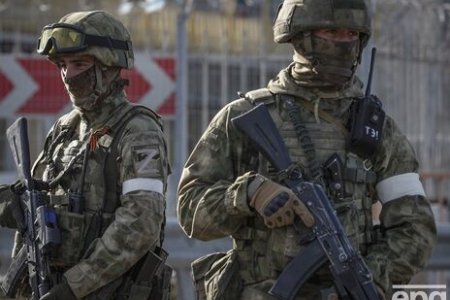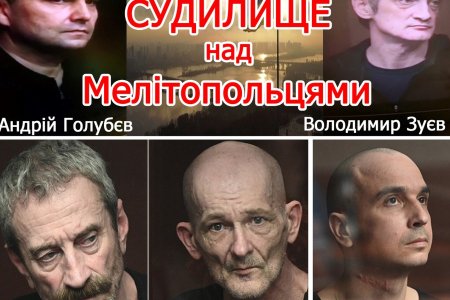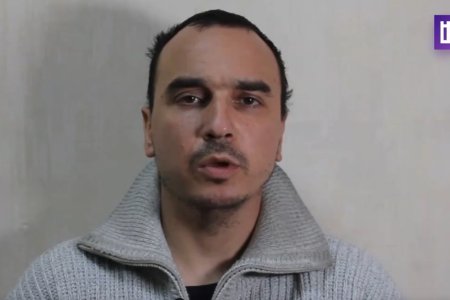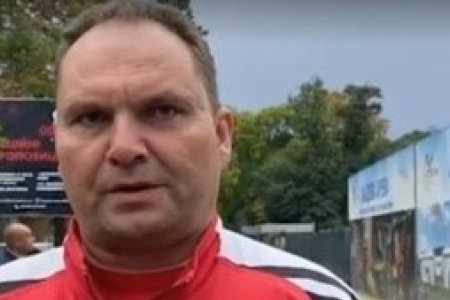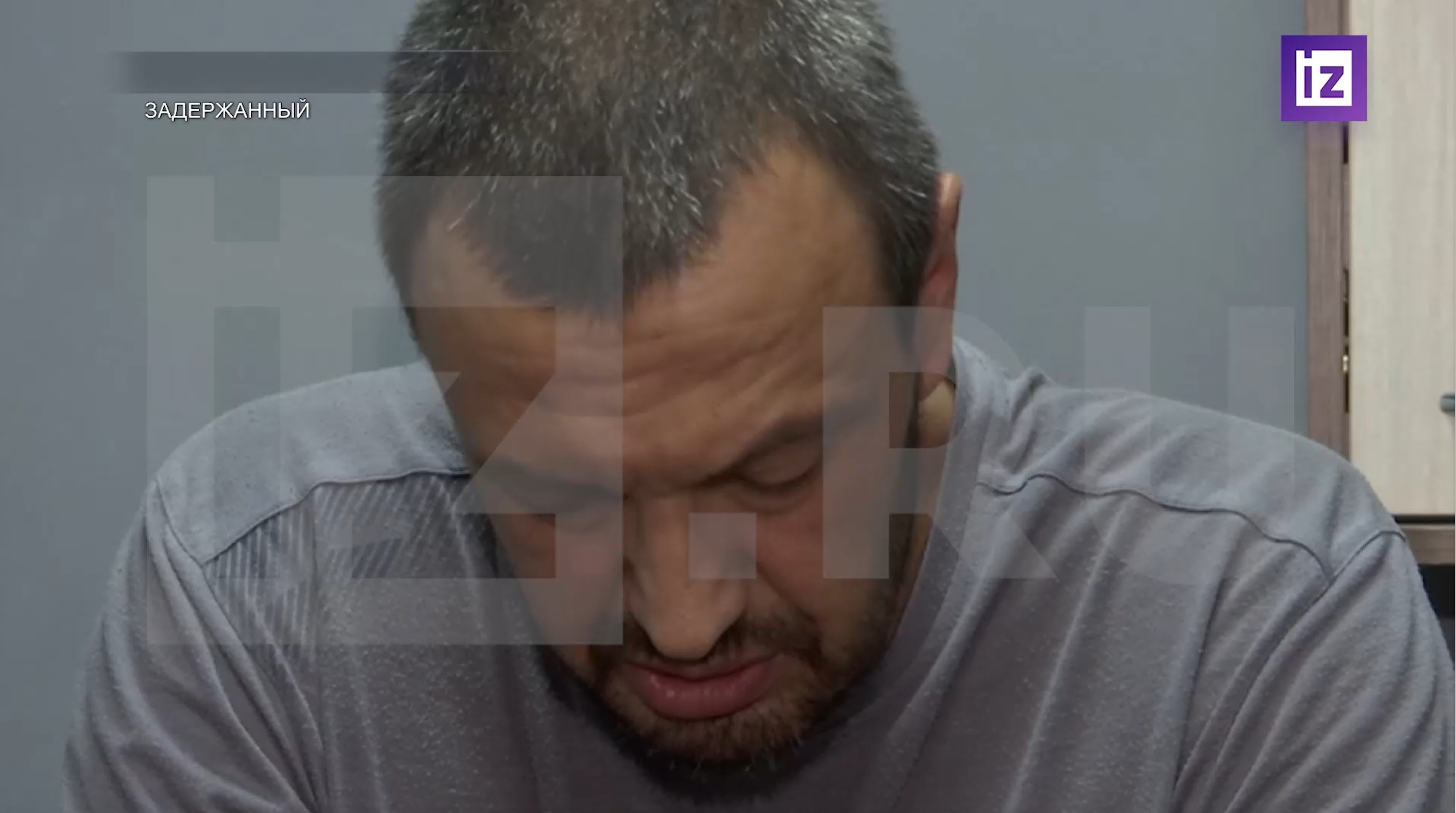
Russia’s notorious Southern District Military Court has passed 11- and 12-year sentences on charges of immense cynicism against two Ukrainians, abducted from occupied Berdiansk. Both Vitaly Rastorhuev and Volodymyr Kryvtsun were accused of international terrorism’ although the alleged ‘crime’ would have been directed against a legitimate target linked with Russia’s invasion of Berdiansk, namely the Russian-installed ‘mayor’ of the occupied city. It is, in fact, just as likely that there was no crime, only two civilian hostages, one of whom at least was savagely tortured into ‘confessing’ to whatever was demanded of him for Russian propaganda.
Disturbingly little is known about either man, with the information about the ‘trial’ largely deriving from the charges illegally laid under Russian legislation and the ‘confession’ from Vitaly Rastorhuev while held incommunicado by his Russian abductors. Since the video shows the tattoo on his body of the Ukrainian trident, it seems clear that Rastorhuev used Russia’s euphemistic term ‘special military operation’ for its full-scale invasion of Ukraine under duress.
Rastorhuev (b. 09.10.1976) and Kryvtsun, who are friends, were abducted on 13 July 2022, however it was only in June 2023 that the Crimean Human Rights Group learned that they were held prisoner in SIZO No. 2. This is one of the two remand prisons which Russia opened in occupied Crimea following its full-scale invasion and which it is using to hold Ukrainian civilian hostages and political prisoners.
The charges against Rastorhuev and Kryvtsun were of ‘planning an act of international terrorism’ under Article 361 § 1 (and 30 § 3) of Russia’s criminal code. It was on these charges that Rastorhuev was sentenced on 18 April 2024 to 12 years’ maximum-security imprisonment, Kryvtsun to 11 years. Presiding ‘judge’ Aleksei Abdulmazhitovich Magomadov and two colleagues from the Southern District Military Court in Rostov ordered that the first three years of each sentence be in a prison, the harshest of Russia’s penal institutions.
It was claimed that the men had taken part in an alleged attempt to blow up Oleksandr Saulenko, a collaborator whom Russia was calling ‘mayor’ of occupied Berdiansk. In August 2022, Russian propaganda media, such as Izvestia broadcast video footage which showed what appeared to be an unidentifiable person planting something under a car, and Rastorhuev’s ‘confession’ to having, purportedly, done this on instructions from his ‘handler’ in Ukraine’s Security Service [SBU]. Essentially everything about the video is typical of the FSB genre, with Rastorhuev clearly stressed and almost certainly reciting what he had been forced to learn by heart. There are also tell-tale storylines, with the FSB invariably obtaining ‘confessions’ that suggest that a person worked for the SBU for some kind of mercenary motive or because he was threatened with prosecution, rather than out of patriotism. In this case, Rastorhuev had supposedly been offered help both in getting his family out of occupied territory and “with a large loan”. It was claimed that he (all of these propaganda media reports mention him, not ‘them’, although the two men were seized at the same time) had planned to detonate a homemade explosive device on 16 July.
In a later RIA Novosti report, all of the elements needed for Russia to use Article 361 on supposed ‘international terrorism’ were applied, with the news agency claiming to be quoting Rastorhuev himself. He had purportedly said that he was planning to detonate the bomb near the Mayak House of Culture. Since two Russian-installed collaborators (Saulenko and Borovko), even by Russian standards, could not justify a charge of ‘international terrorism’, Rastorhuev was claimed to have stated that “the plan was not to eliminate Saulenko and Borovko. On that date, a city event was planned at the Mayak House of Culture which was to be attended by civilians, including people living in Russia.”
Russia is an invading state and there were no grounds for believing that any Russians near the House of Culture would be civilians. Nor is there any evidence on occupied territory of Ukraine having targeted civilians. Article 361 on so-called ‘international terrorism’ was only introduced in 2016 and had not been used before Russia’s full-scale invasion of Ukraine. An ‘act of international terrorism’ is supposed to be an explosion, act of arson or other actions, committed outside Russia and jeopardizing the life, health, freedom or inviolability of Russian citizens “for the purpose of violating the peaceful co-existence of states and peoples, or aimed against the interests” of Russia. The aggressor state is now using this surreal charge against a large number of Ukrainian civilians abducted from occupied parts of Kherson and Zaporizhzhia oblasts. As if the alleged ‘confession’ were not already implausible enough, Rastorhuev was supposed to have said: “Since the beginning of the special military operation they began to instil in me a feeling of hatred to residents of Russia and taught me to use homemade explosive devices.”
It was further claimed that Rastorhuev had been ‘recruited from the ‘Opir’ [‘Resistance’] civic movement, supposedly created after the beginning of the full-scale invasion by SBU operative Yevhen Astakhov.
The ‘trial’ began on 18 August 2023. Since there were a fairly large number of hearings, it is possible that ‘confessions’ obtained under duress while the men were held incommunicado were retracted once they were acknowledged to be in Russian captivity and able to see lawyers. It seems likely that the sentences will be appealed.
